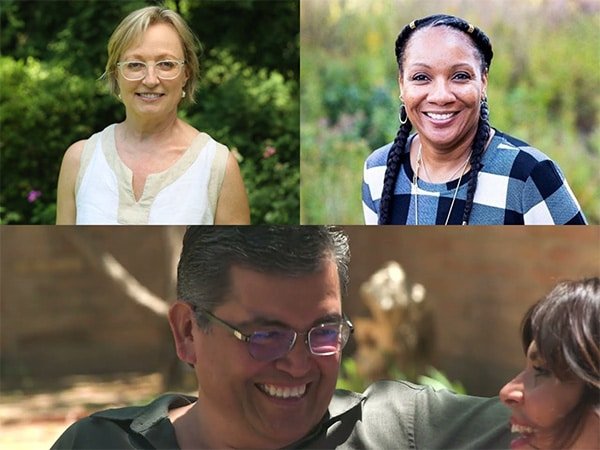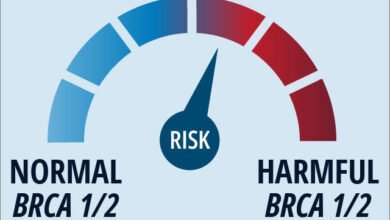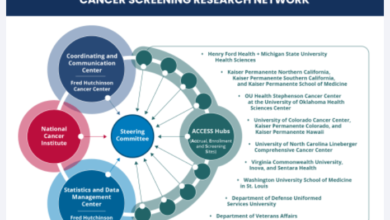What Does It Mean to Get Diagnosed with Lynch Syndrome?

Adrienne Skinner, Wenora Johnson, and Alejandro Mirazo each have an increased risk of getting certain cancers due to an inherited condition known as Lynch syndrome. While each of their stories is different, they share commonalities between the lack of awareness that Lynch syndrome existed, the shocking discovery that it did, and the need to stay on top of their health like never before.
“My sister went in for a procedure because she had a bad Pap smear and was in surgery for 14 hours because, during the time that the surgeon had her on the table, the surgeon discovered three distinct cancers,” Skinner said. “At that point, knowing that Lynch is genetically passed along, they tested all of us.”
Skinner said that in addition to discovering she had Lynch syndrome, they also found she passed it on to three of her four daughters. When she learned about the risks associated with this condition, it forced her to adopt a more proactive mindset about her health. This included a full hysterectomy to prevent gynecological cancers, annual colonoscopies, and endoscopies every other year.
Johnson also became more proactive once she tested for Lynch syndrome following her diagnosis of colorectal cancer in 2011. After discussing it with her gynecologist and oncologist, she opted for a hysterectomy. “When I had a total hysterectomy done and a biopsy was completed, I was stage 1a endometrial cancer—that was a wake-up call for me, letting me know that I cannot take for granted this Lynch syndrome diagnosis,” she said.
Mirazo’s discovery came after agreeing to participate in the Mayo Clinic Tapestry DNA Sequencing Research Study. He thought he was healthy at the time and would merely serve as a “data point” in the study. Instead, he learned he had Lynch syndrome, which led to a colonoscopy and diagnosis of early-stage colon cancer.
“I had never heard of Lynch syndrome. It was of course a little bit scary when you start thinking about your kids and other family members who have not been tested,” Mirazo said. “There is no easy solution … you have to be vigilant.”
Lynch syndrome is the most common cause of hereditary colorectal cancer—with a lifetime risk of 68.7% in men and 52.2% in women—which is why it is additionally known as hereditary non-polyposis colorectal cancer (HNPCC). But people with Lynch syndrome are also at an increased risk of developing other cancers, including endometrial, gastric, ovarian, pancreatic, prostate, small bowel, urinary tract, bile duct, sarcomas, and brain cancers. An estimated one in 300 people have a mutation in one of the five genes (EPCAM, MLH1, MSH2, MSH6, and PMS2) associated with Lynch syndrome, which was named after Henry T. Lynch, MD, FAACR, a pioneer in cancer genetics research.
Skinner, Johnson, and Mirazo have previously shared their experiences with the American Association for Cancer Research (AACR), hoping to help more people learn about Lynch syndrome and what it means for those with this condition.
Adrienne Skinner
When a routine blood test revealed that Skinner’s liver enzymes were off the charts, she had a scan that found a tumor blocking the bile duct and pancreatic duct. After a surgeon discovered that her disease had spread to the liver, the only option to treat her stage 4 disease was chemotherapy. After the chemo stopped working, her doctor recommended her for a clinical trial testing the immunotherapy pembrolizumab (Keytruda) in people with cancer like hers that had a high microsatellite instability (MSI). As part of the trial, an endoscopic biopsy was performed on the tumor within three months of starting treatment.
“When I [came] to, the surgeon comes over to me and says, ‘If someone hadn’t told me you have ampullary cancer I wouldn’t have known because there is nothing in there,” Skinner said. “That was a miracle.”
Skinner continued to receive pembrolizumab through the trial for two years and is still cancer free.
Wenora Johnson
Johnson has been diagnosed with three different types of cancer—colorectal, endometrial, and basal cell carcinoma—all within the span of a decade.
“I would say to individuals who are in a position of maybe being predisposed to cancer or having a familial cancer is: Please, get genetically tested. I would have been able to get tested at the age of 30 instead of waking up on a surgery table at the age of 45 being told that I have a late-stage cancer.”
Johnson continues to maintain regular surveillance for cancer and preach the importance of cancer research.
“Research is coming up with new and innovative ways to treat cancer,” she said. “It’s important because my children have a 50% chance of getting Lynch syndrome and then passing it on to their children. So, it’s so imperative that the future is bright.”
Alejandro Mirazo
Following his colorectal cancer diagnosis, Mirazo had a successful surgical resection and was recommended adjuvant chemotherapy to reduce the chances of recurrence. So far, two of his children have tested negative for Lynch syndrome, much to his relief, and the plan is for his youngest son to be tested when he turns 18.
His experience has helped him to appreciate the value of clinical research and further understand the need to spread awareness of its importance.
“We need to communicate this broadly,” Mirazo said, “but then we have to work on making it accessible to everyone—for example, to communities of color, communities of low income, and those with limited health care.”
Source link
#Diagnosed #Lynch #Syndrome



